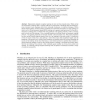Free Online Productivity Tools
i2Speak
i2Symbol
i2OCR
iTex2Img
iWeb2Print
iWeb2Shot
i2Type
iPdf2Split
iPdf2Merge
i2Bopomofo
i2Arabic
i2Style
i2Image
i2PDF
iLatex2Rtf
Sci2ools
111
click to vote
MABS
2004
Springer
2004
Springer
Formal Analysis of Meeting Protocols
Organizations depend on regular meetings to carry out their everyday tasks. When carried out successfully, meetings offer a common medium for participants to exchange ideas and make decisions. However, many meetings suffer from unfocused discussions or irrelevant dialogues. Within Social Science general, informal meeting guidelines are sometimes formulated. To study meetings in detail, we first formalize general properties of meetings and a generic meeting protocol for the role interactions in meetings that is coherent with such guidelines. This generic protocol is used as a starting point to study real-life meetings. First an example meeting is simulated based on the generic meeting protocol. The general properties are formally verified in the simulation trace. Next, these properties are also verified formally against empirical data of a real meeting in the same context. A comparison of the two traces reveals that a real meeting is more robust since when exceptions happen and the prop...
Related Content
» MuCAPSL
| Added | 02 Jul 2010 |
| Updated | 02 Jul 2010 |
| Type | Conference |
| Year | 2004 |
| Where | MABS |
| Authors | Catholijn M. Jonker, Martijn C. Schut, Jan Treur, Pinar Yolum |
Comments (0)

